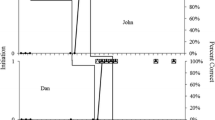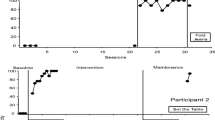Abstract
Students with developmental disabilities may not have the necessary skills or the same opportunities to access multimedia-based leisure materials as their typical peers. Portable multimedia devices such as the iPod Touch® may provide them with a useful tool for accessing age-appropriate leisure material. The present study examined the feasibility of teaching 3 students with developmental disabilities to independently operate an iPod to watch age-appropriate entertainment videos. A delayed multiple-probe design across participants was implemented with baseline, intervention, fading, and follow-up phases. Video modeling and least-to-most response prompting were successfully used to teach these 3 students to operate an iPod Touch® to watch preferred videos without adult assistance. The results complement previous findings supporting the use of video modeling as an instructional strategy and add to the literature by using portable multimedia devices as assistive technology for teaching an age-appropriate leisure skill.

Similar content being viewed by others
References
Caldwell, L. (2005). Leisure and health: Why is leisure therapeutic? British Journal of Guidance & Counseling, 33(1), 7–26.
Coyne, P., & Fullerton, A. (2004). Supporting individuals with autism spectrum disorder in recreation. Champaign, IL: Sagamone.
Iwasaki, Y. (2007). Leisure and quality of life in an international and multicultural context: What are major pathways linking leisure to quality of life? Social Indicators Research, 82(2), 233.
Jerome, J., Frantino, E. P., & Sturmey, P. (2007). The effects of errorless learning and backward chaining on the acquisition of internet skills in adults with developmental disabilities [Electronic version]. Journal of Applied Behavior Analysis, 40(1), 185–189.
Kennedy, C. H. (2005). Single-case designs for educational research. Boston: Allyn & Bacon.
Luyben, P. D., Funk, D. M., Morgan, J. K., Clark, K. A., & Delulio, D. W. (1986). Team sports for the severely retarded: Training a side-of-the-foot soccer pass using a maximum-to-minimum prompt reduction strategy. Journal of Applied Behavior Analysis, 19(4), 431–436.
Matson, J. L., & Marchetti, A. (1980). A comparison of leisure skills training procedures for the mentally retarded. Applied Research in Mental Retardation, 1(1–2), 113–122.
McIntyre, L. L., Kraemer, B. R., Blacher, J., & Simmerman, S. (2004). Quality of life for young adults with severe intellectual disability: Mothers’ thoughts and reflections. Journal of Intellectual & Developmental Disability, 29(2), 131.
Patterson, I. (2004). Snoezelen as a casual leisure activity for people with a developmental disability. Therapeutic Recreation Journal, 38(3), 289–300.
Schleien, S. J., Meyer, L. H., Heyne, L. A., & Brandt, B. B. (1995). Lifelong leisure skills and lifestyles for persons with developmental disabilities. Baltimore: Paul H Brookes Publishing Co.
Schleien, S. J., & Ray, M. T. (1988). Community recreation and persons with disabilities: Strategies for integration. Baltimore: Paul H Brookes Publishing Co.
Schleien, S. J., Wehman, P., & Kiernan, J. (1981). Teaching leisure skills to severely handicapped adults: An age-appropriate darts game. Journal of Applied Behavior Analysis, 14(4), 513–519.
Sparrow, S. S., Cicchetti, D. V., & Balla, D. A. (2005). Vineland-II Adaptive Behavior Scales (2nd ed.). Minneapolis: Pearson.
Thompson, D., Whitmarsh, J., Southern, L., Brewster, S., & Emira, M. (2009). Access to leisure activities: The perception of children and young people with autistic spectrum disorder or ADHD and their parents/carers: Walsall Teaching Primary Care Trust Report.
Author information
Authors and Affiliations
Corresponding author
Rights and permissions
About this article
Cite this article
Kagohara, D.M. Three Students with Developmental Disabilities Learn to Operate an iPod to Access Age-Appropriate Entertainment Videos. J Behav Educ 20, 33–43 (2011). https://doi.org/10.1007/s10864-010-9115-4
Published:
Issue Date:
DOI: https://doi.org/10.1007/s10864-010-9115-4




